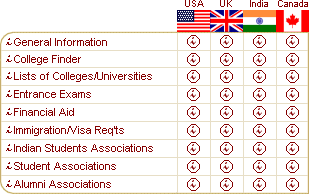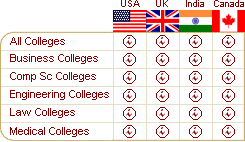 |
|
 Education Education
You should also explore other sources for financial aid. Understand immigration/visa requirements and procedures. Learn from others who have been successful. Find out how they achieved success, how and why they made those decisions that led to their success, and how hard they worked to become successful. Talk to others who are either in similar situation or are in fact going through what you plan to do. In a nutshell, gather, synthesize and analyze information from various sources. Your path to your success will be unique, but leverage all the information that can help you formulate your very own path to your success. And, just remember. It is not acceptable to be less than the best you can be. Success is the outcome of deliberate decisions and good old hard work. Success is achievement, not entitlement. You have to earn your success, one step at a time. So let's get started. Just a comment for prospective students from India. We recognize that IT education is of great interest. No programs exist in North America for "IT education" as such. Instead, both the computer science and computer engineering programs address the area of IT. Some terminology for our friends from India. "School" refers to not only the institutions of primary and secondary education, but also to institutions of higher education which are more commonly referred to as colleges and universities in India. "Undergraduate" studies/programs refers to bachelor's degree programs, while "graduate" studies/programs refers to master's and PhD degree programs.
Be aware that higher education is expensive outside of India even for local residents, but it is particularly expensive for International students. Most government-supported institutions impose higher tuition fees on international students. While private institutions do not impose such differential fees, the cost of education is substantially higher than the government-supported institutions. In either case, many sources of funding that are available to local students are not available to international students. Be extremely careful while making decision to pursue education abroad, particularly if financial aid is a critical issue. You are well advised to ensure your financial well being prior to packing your bags for attending a college/university. The proposition that one only needs to get there and then one can obtain financial aid is riddled with high risk. It can happen in some instances, but what if it doesn't! For most international students, financial aid is a serious issue. Financial aid is generally not available for international students wishing to pursue undergraduate education. While extremely restrictive, financial assistance for graduate education is more readily available for engineering and computer sciences programs. The risk is too great to go abroad without financial aid, if it a critical issue, with the hope that you will secure it once you get there. General information on financial aid is available here. However, we strongly recommend that you learn about the availability of financial aid at the schools of your choice. Most countries impose severe employment restrictions on international students. As one expects, these rules vary from country to country. The US seems to be more liberal in that international students are often permitted to work on-campus through the school year, and off-campus during the summers under the "training visa" provision. Your earnings from such sources can only augment your financial resources, but they will not come even close to fulfilling your financial needs. International students in Canada are not permitted to gain employment without an explicit authorization from the immigration officials. Such authorization is nearly impossible to obtain, unless you have some form of assistantship from your college/university. Colleges/universities assist international students in obtaining visas. Check for the immigration/visa procedures employed by each college/university. Student visas explicitly prohibit employment. The only exception seems to be the US where international students are often permitted to work on-campus through the school year, and off-campus during the summers under the "training visa" provision. Earnings from such sources is only a drop in the bucket of your overall financial needs. The student visa expires when you finish your education. It is possible to get some sort of work permit to stay on beyond that. However, it would depend on the country and the immigration rules at the time. Currently, the US is fairly liberal in granting such permits, provided you obtain a job and your employment in that position is deemed not to displace another US resident. Indian Students Associations, Student Associations in general and Alumni Associations exist in many colleges/universities. They may be a good resource for information and support, not only for before arriving but also through your stay. Check for these associations at individual colleges/universities.
|
 |
|
 |
|||||


 Generally speaking, within north America, entrance exam requirements are as follows:
Generally speaking, within north America, entrance exam requirements are as follows: 


